Imagine living in a world where dietary fats are not vilified but celebrated for their critical role in maintaining our health. We are on the cusp of such an understanding, with a growing number of health enthusiasts and researchers acknowledging the importance of “good” fats in our diet. These essential nutrients are the source of energy, contribute to lowering blood cholesterol, and are integral to cell growth. So, how do we distinguish between the “good” fats that nourish our body and the “bad” fats that lead to health issues? And could supplements like Omega Krill and Brain Octane MCT Oil be the secret to optimizing our fat intake? This blog post dives into the essence of dietary fats and how they can fuel your path to wellness.
🥑 The Fats Misconception: Shedding Light on Dietary Truths
For decades, fats have been the villains of the nutrition world, indiscriminately grouped into a category of “unwanted” nutrients. However, not all fats are created equal. Understanding this complexity is vital for anyone looking to thrive healthfully. “Good” fats, such as monounsaturated and polyunsaturated fats found in avocados, nuts, and fish, are instrumental in supporting our metabolism and reducing the risk of heart disease.
Contrary to popular belief, dietary fats do not equate to body fat automatically. They are a dense form of energy and are essential for the absorption of vitamins A, D, E, and K. The misinterpretation of fats’ role in our diet has led to a proliferation of low-fat products that often compensate for taste with added sugars and salts, leading to other health concerns.
🔍 The Villains Unveiled: Understanding “Bad” Fats
“Bad” fats, comprising mainly trans fats and certain saturated fats, are the true culprits behind the negative health outcomes often associated with fat consumption. These fats can be found in processed foods, certain meat and dairy products, and are infamous for their role in increasing LDL cholesterol (the “bad” cholesterol) levels, thus enhancing the risk of heart disease and stroke.
Trans fats are particularly hazardous as they not only raise LDL cholesterol but also lower HDL cholesterol (the “good” cholesterol), fostering the buildup of fatty deposits within arteries. Recognizing these fats and limiting their intake is a cornerstone of a heart-healthy diet.
⚡ The Elixir of “Good” Fats: Unleashing the Potential of Supplements
 Supplements like Omega Krill oil and Brain Octane MCT Oil have surfaced as heralds of healthy fat consumption. Omega Krill oil, derived from Antarctic krill, is lauded for its concentration of omega-3 fatty acids, which are linked to reduced inflammation and better heart health. It also contains astaxanthin, an antioxidant that gives the krill oil its distinctive red hue and offers additional anti-inflammatory benefits.
Supplements like Omega Krill oil and Brain Octane MCT Oil have surfaced as heralds of healthy fat consumption. Omega Krill oil, derived from Antarctic krill, is lauded for its concentration of omega-3 fatty acids, which are linked to reduced inflammation and better heart health. It also contains astaxanthin, an antioxidant that gives the krill oil its distinctive red hue and offers additional anti-inflammatory benefits.
Brain Octane MCT Oil, a form of medium-chain triglycerides, is rapidly metabolized by the liver, providing an instant source of energy and has been linked to cognitive enhancement and weight management. This efficient energy conversion process means MCT oil is less likely to be stored as fat, aligning with the goal of a healthy fat intake.
🧐 Making the Right Choices: Sourcing “Good” Fats in Your Diet
Incorporating “good” fats into your diet doesn’t have to be a task. A variety of tasty and versatile foods offer these beneficial nutrients. Examples include olive oil, a stellar source of monounsaturated fats, and flaxseeds, which are rich in alpha-linolenic acid, a type of plant-based omega-3 fatty acid.
Eating fatty fish like salmon, mackerel, and sardines can provide a dose of the much-touted omega-3s. For vegetarians and vegans, algae supplements offer a plant-based omega-3 option. Conscious consumption and a bit of ingredient research make navigating the fats in your foods an enlightening experience.
🔬 Embracing Fats: A Balanced View For Long-Term Health
Balancing the types of fats you consume is key to a holistic and healthy diet. “Good” fats should form the majority of your fat intake, aligning with the tenets of well-established dietary practices like the Mediterranean diet, known for its heart-healthy emphasis on fats from olive oil, fish, and nuts.
Understanding your body’s needs, the functions of different fats, and the composition of various foods can empower you to make informed choices, sculpting a diet that supports your health goals without the unnecessary exclusion of fats.
Conclusion
The journey through the complex landscape of dietary fats is one of discovery and transformation. From dismantling age-old misconceptions to celebrating the nourishing power of “good” fats, we have embarked on a path that heralds a healthier, more informed approach to what we put on our plates. With resilience, knowledge, and a dash of culinary creativity, a fat-fortified future awaits—one where every dollop of omega-rich oil and every sip of savvy supplements takes us closer to optimal well-being. Let’s embrace the dietary revolution, where “good” fats are not just accepted but essential components of a vibrant lifestyle.Are you ready to join the movement and redefine the scope of what’s possible within your organization? Connect with me on [LinkedIn] to explore how you can harness the power of Savant’s platform and embark on a journey of unparalleled productivity. 🚀🌟
